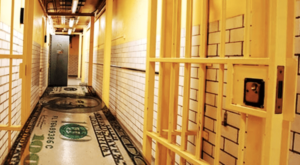
Image courtesy of Counter Current News.
The nation’s private prisons have come up on hard times lately, as big name agencies move to cut ties with the for-profit lockups. But the industry won’t go down without a fight, seeking support (and money) from conservative lawmakers who can help them weather this storm of bad news.
Trouble for the private prison industry began in mid-August when the Department of Justice announced plans to end its use of private prisons. Deputy Attorney General Sally Yates made the announcement in a memo, instructing officials to refrain from renewing contracts with privatized prisons.
“They simply do not provide the same level of correctional services, programs, and resources; they do not save substantially on costs,” Yates wrote in the memo. “And as noted in a recent report by the Department’s Office of Inspector General, they do not maintain the same level of safety and security.”
Shortly thereafter, stocks for the nation’s two largest publicly traded, private prison operators — Correctional Corp. of America and GEO — plunged a whopping 40 percent. Trading in both stocks were occasionally stopped amid the sharp decline.
According to Business Insider, the Department of Homeland Security later followed in the footsteps of the Justice Department by announcing it would re-evaluate its Immigration and Customs Enforcement Agency’s use of private prison companies to run its detention centers.
Democratic presidential nominee Hillary Clinton even praised the government agencies for their efforts to phase out the use of for-profit prisons.
“You shouldn’t have a profit motivation to fill prison cells with young Americans,” Clinton said. “I’m glad that we’re ending private prisons in the federal system; I want to see them ended in the state system.”
Just last week, Corrections Corp. of America announced a “restructuring effort” that would result in the layoffs of over 50 workers at its Nashville headquarters, the Tennessean reports.
Despite the constant wave of misfortune, some privatized prison companies have vowed to fight back. According to the Washington Post, the private prison industry — which garners billions of dollars in revenue each year — is lobbying against the DOJ’s for-profit prison phase-out, while encouraging Republican legislators to speak up on their behalf.
The private prison industry argued that the DOJ’s decision to abandon ship was based on “faulty research” and that there’s still a need for private contractors due to overcrowding in federal prisons, the Washington Post reports.
“We think the private sector facilities did very well, that they were comparably secure,” said George Zoley, chief executive of the GEO Group.
Earlier this month, the company submitted a formal protest to the Government Accountability Office, asserting that cutting a private prison contract would be an “improper and illogical change,” Business Insider reports.
Conservative lawmakers have also questioned the DOJ’s policy changes.
“We are concerned that the DOJ’s instructions put politics ahead of policy when it comes to maintaining flexibility in our prison system, encouraging vital criminal alien law enforcement and providing the best value for our taxpayers,” the legislators wrote.
To give Republican lawmakers an extra incentive for their support, the GEO Group donated roughly $150,000 to a pro-Donald Trump super PAC just one day after the DOJ’s announcement, according to Mother Jones. Republican presidential nominee Trump is a long-time advocate of the privatized prison industry.
“I do think we can do a lot of privatizations and private prisons,” Trump said at a town hall event back in March. “It seems to work a lot better.”
According to Business Insider, the companies gained a small victory Tuesday after the Corrections Corporation of America announced a contract extension with the Immigration and Customs Enforcement Agency for a detention center in Texas. The DHS is still in the process of evaluating its use to for-profit prison companies.


